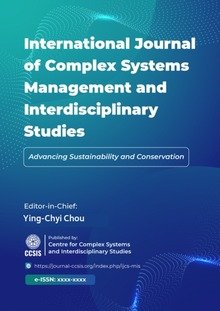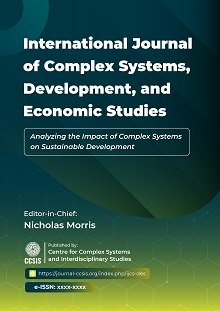This site serves as the publishing platform for two peer-reviewed academic journals by the Centre for Complex Systems and Interdisciplinary Studies (CCSIS):
-
The International Journal of Complex Systems Management and Interdisciplinary Studies (IJCS-MIS) – integrating complex systems theory with management sciences and interdisciplinary research.
-
The International Journal of Complex Systems, Development, and Economic Studies (IJCS-DES) – examining complex systems in economic development, policy, and related fields.
Both journals offer open-access publishing, rigorous peer review, and a global forum for cutting-edge research, fostering innovation across these interconnected disciplines.
Journals
-
International Journal of Complex Systems Management and Interdisciplinary Studies

Title: The International Journal of Complex Systems Management and Interdisciplinary Studies Abbreviation: IJCS-MIS e-ISSN xxxx-xxxx DOI Prefix: xx.xxxxx Editor in Chief: Ying-Chyi Chou, Scopus ID: 36160198500, Tunghai University, Taichung, Taiwan Managing Editor: Jaka Aminata, Scopus ID: 57205338070, Universitas Diponegoro, Semarang, Indonesia Publisher: Centre for Complex Systems and Interdisciplinary Studies (CCSIS) Frequency: Semiannual, January & July The International Journal of Complex Systems Management and Interdisciplinary Studies (IJCS-MIS) is a peer-reviewed journal published by the Centre for Complex Systems and Interdisciplinary Studies (CCSIS). Dedicated to advancing research on the governance, optimization, and strategic oversight of complex systems, the journal integrates perspectives from multiple disciplines. It publishes work that combines systems theory, computational modeling, organizational management, and empirical case studies to address adaptive challenges in socio-technical, environmental, and economic contexts. By fostering cross-disciplinary insights, IJCS-MIS bridges theory and practice, offering innovative solutions to complex real-world problems.
Board of Editors
- Hernando Gil Tovar, Scopus ID: 59242599000, Universidad Surcolombiana, Neiva, Colombia
- Jan Veuger, Scopus ID: 57189264911, Hanzehogeschool Groningen, Groningen, Netherlands
- Muhammad Ridhuan Tony Lim Abdullah, Scopus ID: 36967911500, Universiti Teknologi PETRONAS, Seri Iskandar, Malaysia
- Sami Al-Daghistani, Scopus ID: 57103736300, Centrum för Teologi och Religionsvetenskap, Lund, Sweden
- Jerry Chi, Andrew University, Michigan, USA
- Rizaldi Yusfiarto, Scopus ID: 57261760100, Universitas Islam Negeri Sunan Kalijaga, Yogyakarta, Indonesia
Focus and Scope
IJCS-MIS is a premier peer-reviewed forum dedicated to advancing the understanding, governance, and strategic management of complex adaptive systems through integrative interdisciplinary research. The journal specifically focuses on the intersection of systems theory, management science, computational modeling, and empirical investigation to address multifaceted challenges across diverse domains.
Core Research Themes
- Governance & Strategic Oversight of Complex Systems: Developing and analyzing frameworks, policies, and leadership strategies for steering complex socio-technical, environmental, and economic systems towards desired outcomes under conditions of uncertainty and adaptation.
- Optimization & Adaptive Management: Designing and evaluating methods for improving the performance, resilience, efficiency, and sustainability of complex systems, recognizing their dynamic and evolving nature.
- Interdisciplinary Integration: Synthesizing knowledge, theories, and methodologies from diverse fields (e.g., systems science, computer science, organizational studies, economics, engineering, ecology, social sciences) to generate novel insights into complex systems behavior and management.
Key Methodological Approaches
- Systems Theory and Complexity Science: Application of concepts like emergence, self-organization, non-linearity, network analysis, and feedback loops.
- Computational and Mathematical Modeling: Agent-based modeling, system dynamics, network modeling, simulation, optimization algorithms, and data-driven approaches for analyzing and predicting complex system behavior.
- Organizational and Management Theory: Perspectives on structure, decision-making, strategy, leadership, innovation, and adaptation within complex organizational and inter-organizational contexts.
- Empirical Case Studies & Qualitative/Quantitative Analysis: Rigorous investigation of real-world complex systems to derive lessons, validate models, and inform theory.
Primary Application Domains
- Socio-Technical Systems: Critical infrastructure (energy, transport, ICT), smart cities, healthcare systems, large-scale engineering projects, cybersecurity governance.
- Environmental Systems: Climate change adaptation and mitigation, ecosystem management, natural resource governance, resilience to environmental shocks.
- Economic and Organizational Systems: Global supply chains, financial markets, innovation ecosystems, organizational networks, public policy implementation, economic development strategies.
Journal Aims
- Publish high-quality research that demonstrably integrates perspectives from at least two distinct disciplines.
- Bridge the gap between theoretical advances in complex systems science and practical management challenges.
- Foster dialogue and knowledge exchange among researchers and practitioners dealing with complexity across different domains.
- Provide insights that inform both the development of theory and the improvement of practice in managing complex adaptive systems.
Key Exclusions (to maintain focus)
- Studies focusing on simple or purely technical systems without significant socio-economic, organizational, or adaptive management dimensions.
- Research conducted solely within a single traditional discipline without genuine interdisciplinary integration relevant to complex systems management.
- Purely abstract mathematical or computational studies without clear application or implications for the governance, optimization, or strategic oversight of complex systems.
- Routine applications of established management techniques without a complexity science perspective or novel interdisciplinary contribution.
-
International Journal of Complex Systems, Development, and Economic Studies

Title: International Journal of Complex Systems, Development, and Economic Studies Abbreviation: IJCS-DES e-ISSN xxxx-xxxx DOI Prefix: xx.xxxxx Editor in Chief: Nicholas Morris, Scopus ID: 58289649100, La Trobe University, Melbourne, Australia Managing Editor: Jaka Aminata, Scopus ID: 57205338070, Universitas Diponegoro, Semarang, Indonesia Publisher: Centre for Complex Systems and Interdisciplinary Studies (CCSIS) Frequency: Semiannual, January & July The International Journal of Complex Systems, Development, and Economic Studies (IJCS-DES) is a peer-reviewed journal published by the Centre for Complex Systems and Interdisciplinary Studies (CCSIS). Serving as an interdisciplinary platform, it advances research that applies complex systems theory to socio-economic development, examining how dynamic interactions, emergent behaviors, and nonlinear feedback shape economic growth, policy outcomes, and sustainability challenges. By integrating systems thinking, computational modeling, and empirical analysis, the journal deepens our understanding of development processes and contributes to more resilient and adaptive economic strategies.
Board of Editors
- Morgane Chevé, Scopus ID: 26654691400, Université Le Havre Normandie, Le Havre, France
- Sylvain Baumann, Scopus ID: 36124808300, Normandie Université, Caen, France
- Nurulhuda Mohd Satar, Scopus ID: 59334766000, Universiti Malaya, Kuala Lumpur, Malaysia
- Chih-Yun Wu, Scopus ID: 56132648600, Tunghai University, Taichung, Taiwan
- Christina A. Stringer, Scopus ID: 7005875883, The University of Auckland Business School, Auckland, New Zealand
- Nakajima Yoshihiro, Osaka City University, Osaka, Japan
- Toshiyuki Matsui, Japan
Focus
IJCS-DES focuses on the interdisciplinary application of complex systems theory to understand socio-economic development. It centers on how dynamic interactions, emergent behaviors, and nonlinear feedback drive economic growth, policy effectiveness, and sustainability challenges. The journal prioritizes research that integrates systems thinking, computational modeling, and empirical analysis to foster resilient and adaptive economic strategies.
Scope
IJCS-DES welcomes theoretical, methodological, and applied contributions addressing (but not limited to):
-
Complexity in Development Economics: Emergent poverty/inequality traps, non-equilibrium growth models, resilience of developing economies.
-
Sustainability & Adaptation: Climate-economy feedbacks, resource conflicts, transitions to low-carbon systems, socio-ecological resilience.
-
Policy & Governance: Nonlinear policy impacts, adaptive governance, systemic risks (financial, health, food), institutional evolution.
-
Methodological Innovations: Agent-based/network/system dynamics models, data-driven complexity analytics, hybrid empirical-computational approaches.
-
Socio-Economic Dynamics: Innovation ecosystems, urbanization patterns, labor market emergence, technology diffusion, behavioral economics in complex settings.
Excluded: Purely theoretical complex systems studies without socio-economic relevance; conventional econometric analyses lacking a systems perspective; non-empirical policy commentaries.



 All publication from International Journal of Complex System Management and Interdisciplinary Studies are licensed under a
All publication from International Journal of Complex System Management and Interdisciplinary Studies are licensed under a 